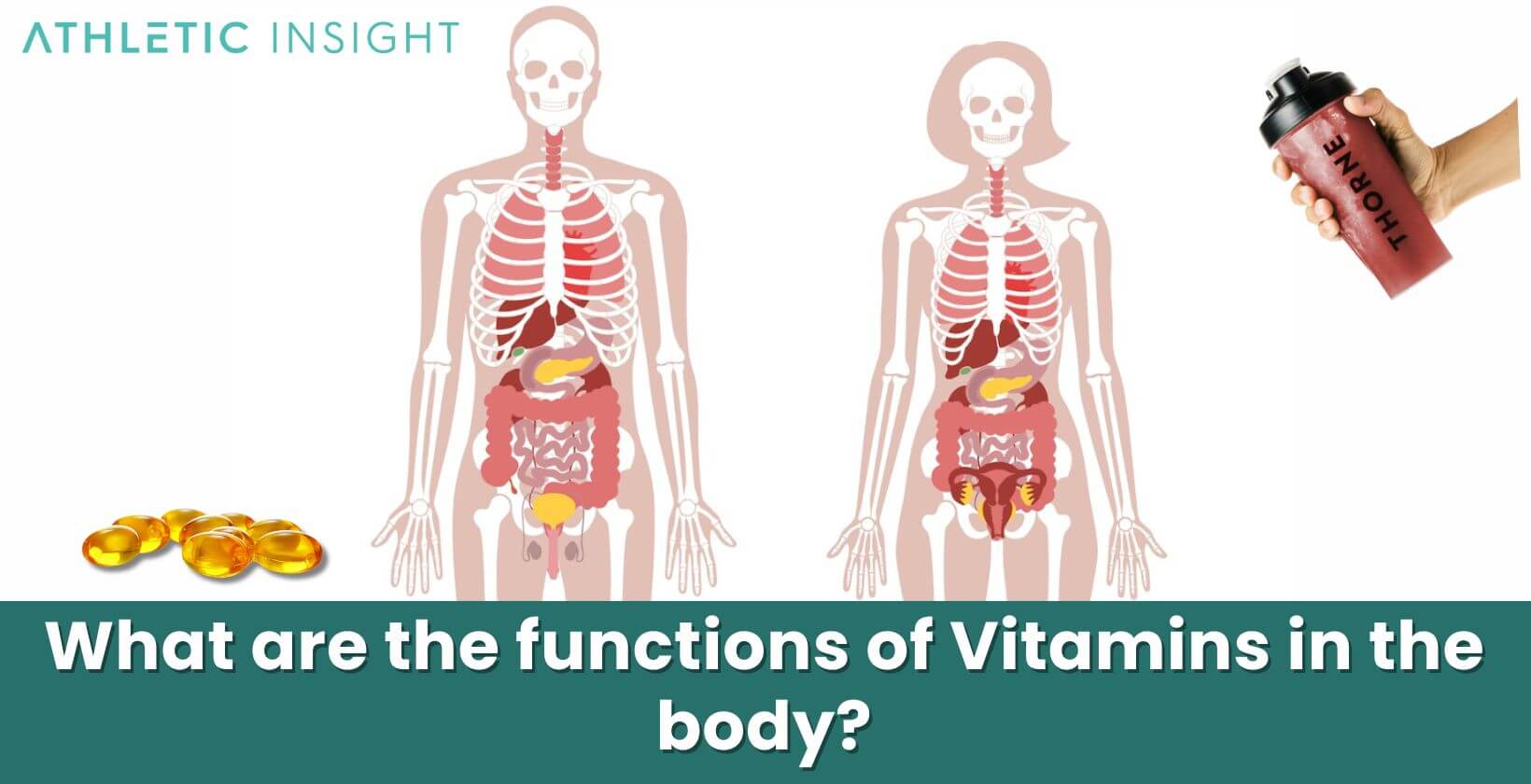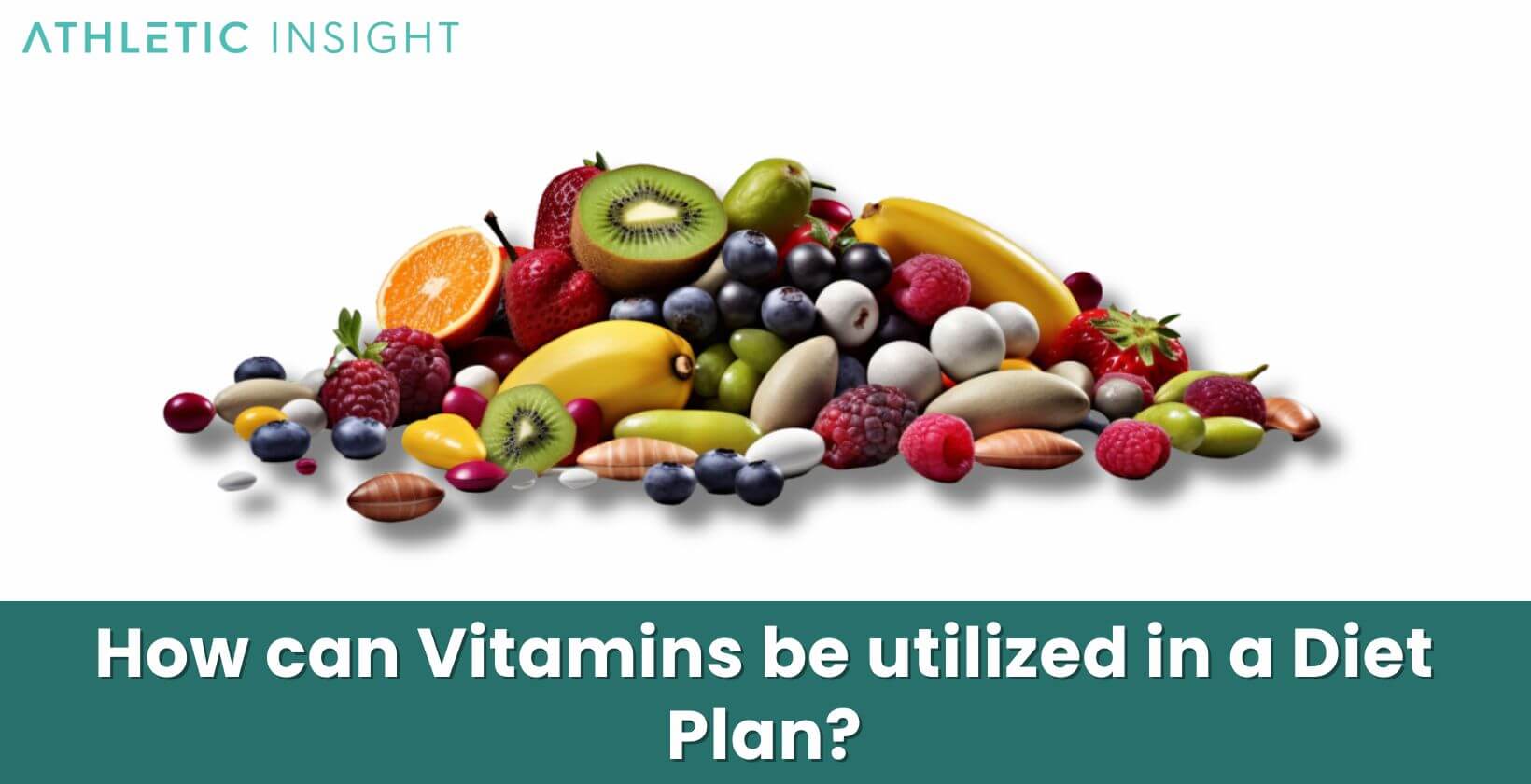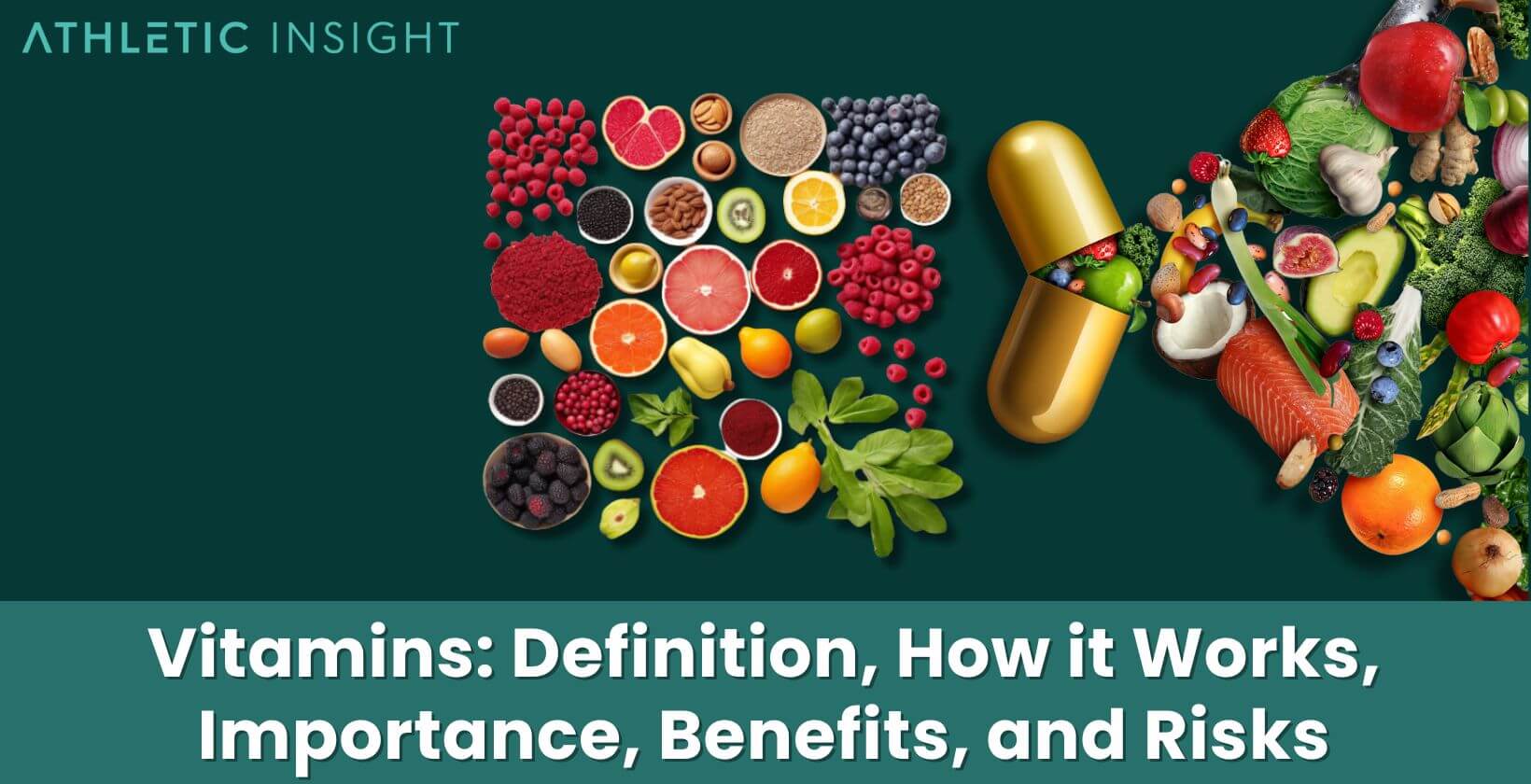Vitamins are critical for maintaining optimal health and vitality. This article will provide a clear understanding of what vitamins are, how they function, and their significance for health. This information will highlight the numerous benefits offered by vitamins and shed light on the potential risks associated with them.
What is a Vitamin?
A vitamin is a micronutrient that your body needs in small quantities to perform specific functions optimally. They are critical to health, but the body can’t manufacture most vitamins. Therefore, it’s necessary to include them in your diet.
Each vitamin has unique roles, from promoting healthy vision to bolstering the immune system. Lack of certain vitamins in the diet can lead to specific deficiencies, each with its symptoms. For instance, a deficiency in vitamin C can result in scurvy, a disease characterized by anemia, exhaustion, and spontaneous bleeding.
How does a Vitamin work?
A vitamin operates in the body by becoming part of complex chemical reactions. Once inside the body, vitamins serve as catalysts, accelerating these chemical reactions. Some vitamins help in the production of energy, while others aid in the production of blood cells, hormones, and genetic material.
Take vitamin D, for instance. After it is consumed or synthesized in the skin under sunlight, it undergoes two changes in the body to become active. This active form of vitamin D helps regulate calcium and phosphate levels in the body, supporting bone health.
What are the functions of Vitamins in the body?
Vitamins perform many functions in the body. For example, vitamin A is critical for maintaining good vision and ensuring the normal functioning of the immune system. Vitamin K aids blood clotting, while the B-vitamins, including B6, B12, and folic acid, play key roles in metabolism and the production of red blood cells.

It’s important to understand that each vitamin has a specific role in the body. The body can’t substitute one vitamin for another. So, every vitamin is needed in the diet to ensure the body can perform all its necessary functions.
How do Vitamins and Minerals work together?
Vitamins and minerals work in tandem to perform a variety of functions in the body. While vitamins are organic compounds, minerals are inorganic, yet both are vital micronutrients. They interact in many biochemical processes, enhancing each other’s absorption and utilization.
Take the case of calcium and vitamin D. Calcium, a mineral, is crucial for bone health. Without vitamin D, the body can’t absorb calcium efficiently. So, these two micronutrients work together to promote bone health. Similar interplays exist between various other vitamins and minerals, emphasizing the need for a balanced diet.
Why are Vitamins essential to Human Health?
Vitamins serve as building blocks for your body, contributing to its overall function and growth. They perform vital roles such as aiding in the production of energy, helping the body grow and develop, and protecting it from environmental damage. In other words, they facilitate the body’s basic physiological processes, keeping you healthy and active.
Without adequate vitamins, your body may struggle to perform these functions effectively, leading to a range of health issues. Each vitamin plays a unique part, making it essential to have a well-rounded intake of vitamins to ensure overall well-being.
What are the two categories of Vitamins?
Vitamins fall into two primary categories: water-soluble and fat-soluble. This classification is based on how the vitamins are absorbed by the body, stored, and expelled.
Water-soluble vitamins dissolve in water and are not stored in the body. They need to be replenished frequently. On the other hand, fat-soluble vitamins are stored in the fatty tissues and liver and are used as needed by the body.
- Water-soluble Vitamins
- Fat-soluble Vitamins
1. Water-soluble Vitamins
Water-soluble vitamins are a group of vitamins that, as their name suggests, are soluble in water. They include the B-complex vitamins and vitamin C. These vitamins are absorbed directly by cells when they come into contact with them during digestion. Because they can’t be stored in the body, it’s crucial to replenish them regularly.
Water-soluble vitamins are vital for energy production and immune function. For instance, vitamin C is known to enhance immune health, while the B vitamins are integral to energy metabolism.
2. Fat-soluble Vitamins
Fat-soluble vitamins, on the other hand, are absorbed along with fats in the diet and are then stored in the body’s fatty tissue and liver. They include vitamins A, D, E, and K. These vitamins are used as needed and don’t have to be consumed every day.
These vitamins play significant roles in vision, bone health, cell function, and blood clotting. For instance, vitamin A is essential for vision, while vitamin D contributes to bone health.
What are the essential Vitamins the body needs?
The body needs a range of vitamins to function optimally, and each vitamin has a unique role in maintaining health. These essential vitamins include vitamin A, vitamin C, vitamin D, vitamin E, vitamin K, and the B-complex vitamins, which include eight different vitamins.

These vitamins are indispensable, each serving a unique role in the body. They all work together to ensure the body functions at its best.
- Vitamin A
- Vitamin C
- Vitamin D
- Vitamin E
- Vitamin K
- Thiamine (Vitamin B1)
- Riboflavin (Vitamin B2)
- Niacin (Vitamin B3)
- Pantothenic acid (Vitamin B5)
- Pyridoxine (Vitamin B6)
- Biotin (Vitamin B7)
- Folate (Vitamin B9)
- Cobalamin (Vitamin B12)
1. Vitamin A
Vitamin A, a fat-soluble vitamin, is primarily known for its role in maintaining good vision. It’s essential for the formation of a light-absorbing molecule in the eyes, which is crucial for both low-light and color vision.
Other roles of vitamin A include supporting the immune system and promoting growth and development. It can be found in a variety of foods, including carrots, spinach, and sweet potatoes. The recommended daily intake varies based on age and sex, but generally, adults need between 700-900 micrograms per day.
2. Vitamin C
Vitamin C, also known as ascorbic acid, is a water-soluble vitamin known for its role in supporting the immune system. It helps stimulate the production of white blood cells, which fight off infections.
Vitamin C also helps in the production of collagen, a protein that helps wounds heal. Citrus fruits, strawberries, bell peppers, and broccoli are rich sources of vitamin C. Adults generally need between 75-90 milligrams of vitamin C per day.
3. Vitamin D
Vitamin D, a fat-soluble vitamin, has a central role in promoting bone health. It assists in the absorption of calcium and phosphorus from your diet, nutrients that are critical for building bones. Lack of this vitamin can lead to conditions like rickets in children and osteomalacia in adults.
Known as the “sunshine vitamin,” Vitamin D can be produced by your body when your skin is exposed to sunlight. It can also be found in a small number of foods, like fatty fish, beef liver, and egg yolks. The recommended daily intake varies based on age, but generally, adults need about 15-20 micrograms per day.
4. Vitamin E
Vitamin E is a fat-soluble vitamin that acts as a powerful antioxidant, protecting your cells from damage by free radicals. These unstable molecules are produced through metabolism and in response to environmental factors like ultraviolet radiation from the sun.
It also plays a role in immune function and DNA repair. Vitamin E can be found in foods like almonds, spinach, and vegetable oils. Adults generally need about 15 milligrams of vitamin E per day.
5. Vitamin K
Vitamin K, a fat-soluble vitamin, plays a crucial role in the process of blood clotting. It activates proteins required for blood to clot, a vital process that prevents excessive bleeding after an injury.
In addition, it contributes to bone health and regulates blood calcium levels. Vitamin K can be found in green leafy vegetables, broccoli, and Brussels sprouts. Adults generally need between 90-120 micrograms of vitamin K per day.
6. Thiamine (Vitamin B1)
Thiamine, also known as vitamin B1, is a water-soluble vitamin that plays a key role in energy metabolism. It aids the body’s cells in converting carbohydrates into energy, which is vital for the functioning of the heart, muscles, and nervous system.
Good sources of thiamine include whole grains, meat, and fish. Deficiency in this vitamin can lead to beriberi, a condition characterized by weight loss, emotional disturbances, and heart problems. Adults generally need about 1.1-1.2 milligrams of thiamine per day.
7. Riboflavin (Vitamin B2)
Riboflavin or vitamin B2 is a water-soluble vitamin that helps in energy production and cellular function, growth, and development. It also plays a crucial role in metabolizing fats and drugs.
It can be found in foods such as eggs, green vegetables, milk and other dairy product, and meat. Adults generally need about 1.1-1.3 milligrams of riboflavin per day. Lack of this vitamin can cause ariboflavinosis, a condition marked by sores in the mouth, skin disorders, and anemia.
8. Niacin (Vitamin B3)
Niacin, also known as vitamin B3, is a water-soluble vitamin involved in numerous aspects of metabolism. It aids in the conversion of food into usable energy, and helps keep the skin, hair, eyes, and liver healthy.
Sources of niacin include meat, poultry, fish, fortified cereals, and peanuts. Adults generally need about 14-16 milligrams of niacin per day. Severe deficiency in niacin can lead to pellagra, characterized by diarrhea, dermatitis, dementia, and even death if not treated.
9. Pantothenic acid (Vitamin B5)
Pantothenic acid, known as vitamin B5, is a water-soluble vitamin that helps the body convert food into energy. It’s a part of coenzyme A, a molecule that assists in several metabolic pathways and is necessary for the synthesis of fats, steroids, and neurotransmitters.
It’s found in almost all food groups, with high amounts in whole grains, avocados, and meats. Adults generally need about 5 milligrams of pantothenic acid per day. Deficiency is rare but can lead to fatigue, insomnia, and depression.
10. Pyridoxine (Vitamin B6)
Pyridoxine, also known as vitamin B6, is a water-soluble vitamin that plays a critical role in the functioning of enzymes involved in protein metabolism. It’s also important for the production of neurotransmitters, substances that transmit nerve signals.
It can be found in foods like fortified cereals, beans, poultry, fish, and some vegetables and fruits, especially dark leafy greens, papayas, oranges, and cantaloupe. Adults generally need about 1.3-1.7 milligrams of vitamin B6 per day. A lack of this vitamin can lead to a form of anemia similar to iron deficiency anemia.
11. Biotin (Vitamin B7)
Biotin, or vitamin B7, is a water-soluble vitamin that aids in the metabolism of fats, carbohydrates, and proteins. It also helps in the production of hormones and cholesterol.
Good sources of biotin include egg yolk, organ meats, yeast, bananas, and broccoli. The body also makes biotin in the intestines. Adults generally need about 30 micrograms of biotin per day. Although rare, deficiency can cause hair loss, skin rash, and neurological disorders.
12. Folate (Vitamin B9)
Folate, or vitamin B9, is a water-soluble vitamin that is pivotal for proper brain function and plays a critical part in mental and emotional health. It aids in the production of DNA and RNA, the body’s genetic material, especially when cells and tissues are growing rapidly, such as during infancy, adolescence, and pregnancy.
Folate can be found in foods such as leafy green vegetables, fruits, dried beans, and peas. Adults need about 400 micrograms of dietary folate equivalents each day. A deficiency can lead to megaloblastic anemia, which causes weakness, fatigue, trouble concentrating, irritability, headache, heart palpitations, and shortness of breath.
13. Cobalamin (Vitamin B12)
Cobalamin, better known as vitamin B12, is a water-soluble vitamin that keeps the body’s nerve and blood cells healthy. It also contributes to the creation of DNA, the genetic material in all cells. Furthermore, vitamin B12 prevents a type of anemia called megaloblastic anemia that makes people tired and weak.
Unlike other B vitamins, B12 is primarily found in animal products like meat, eggs, and dairy. Adults generally need about 2.4 micrograms of vitamin B12 per day. A deficiency can cause tiredness, weakness, constipation, loss of appetite, weight loss, and megaloblastic anemia.
How can Vitamins be utilized in a Diet Plan?
Vitamins are the key elements of any diet plan, playing a crucial role in maintaining overall health and wellness. Eating a balanced diet rich in fruits, vegetables, whole grains, lean proteins, and healthy fats can help ensure the intake of necessary vitamins. It’s important to focus on the intake of nutrient-dense foods that provide large amounts of vitamins and minerals with relatively few calories.

Each vitamin performs specific functions, and no single food contains all the necessary vitamins. Hence, the diet should include a variety of foods to get an array of vitamins. For example, citrus fruits are rich in vitamin C, while dairy products are a great source of vitamin D. Dietary choices should reflect personal health needs, lifestyle, and dietary restrictions.
What vitamins does a Gluten-free Diet need?
People following a gluten-free diet may be at risk of nutrient deficiencies because gluten-free products are often not fortified with vitamins. Specifically, they may need to focus on B vitamins and iron. B vitamins are crucial for energy production, while iron is necessary for the production of hemoglobin that carries oxygen in the blood. Foods like lean meats, seafood, beans, and fortified gluten-free grains can provide these nutrients.
Another crucial vitamin is Vitamin D, which helps the body absorb calcium for healthy bones. Sources can include fatty fish like salmon and mackerel, and fortified gluten-free products. A balanced gluten-free diet that includes a variety of fruits, vegetables, proteins, and whole grains can help ensure the necessary vitamin intake.
Does a Vegan Diet Need Vitamins?
A vegan diet, devoid of animal products, may lack certain nutrients, making it necessary to pay special attention to the intake of certain vitamins. Vitamin B12, typically found in animal products, needs special attention. Fortified foods or supplements can provide this vitamin.
Also, vegan diets may lack sufficient amounts of omega-3 fatty acids, vitamin D, and iodine. Chia seeds, flaxseeds, and walnuts can provide omega-3 fats, sun exposure and fortified foods can provide vitamin D, and iodized salt or seaweed can provide iodine. Thus, with careful planning and attention, a vegan diet can meet all the necessary nutrient needs.
What are the Health Benefits of Vitamins?
Every vitamin has unique benefits to offer for maintaining overall health and wellness. For instance, Vitamin A enhances vision, strengthens the immune system, and supports cell growth. Vitamin C boosts immunity, assists in healing wounds, and helps the body absorb iron. Vitamin D regulates the absorption of calcium and phosphorus, facilitating normal immune system function and maintaining healthy bones and teeth.
Vitamin E protects the body’s cells from damage, while vitamin K is essential for the clotting of blood to prevent excessive bleeding. B vitamins, including B6, B12, niacin, riboflavin, and folate, aid in energy production, iron absorption, immune function, and the maintenance of skin health, among other benefits.
- Enhances vision
- Strengthens the immune system
- Supports cell growth
- Boosts immunity
What are the Health Risks of Vitamins?
While vitamins are essential for good health, excessive intake, usually from supplements, can be harmful. For example, too much Vitamin A can lead to dizziness, nausea, and even hair loss. Excess Vitamin C can cause diarrhea, nausea, and cramps. Overdosing on Vitamin D can result in a buildup of calcium in the blood, causing nausea, vomiting, and frequent urination.
Excessive intake of Vitamin E can cause nausea, diarrhea, stomach cramps, and weaken the body’s ability to clot blood, leading to more bleeding. Overconsumption of Vitamin K can reduce the effectiveness of certain blood-thinning medications. Hence, while vitamins are crucial, they need to be consumed within the recommended limits.
- Dizziness
- Hair Loss
- Nausea
- Diarrhea
- Stomach cramps
- Weaken the body’s ability to clot blood
Can you overdose on vitamins?
Yes, overdosing on vitamins is a real risk, primarily when consumed through supplements. It’s harder to overdose on vitamins from food because they are more diluted and the body can manage the excess more easily. Each vitamin has an upper limit, and when this limit is surpassed, it can result in what’s known as hypervitaminosis, or vitamin toxicity.
For example, consuming too much Vitamin A can lead to dizziness, nausea, hair loss, and severe headaches. Excessive Vitamin D can cause a buildup of calcium in your blood, leading to frequent urination, nausea, and vomiting. It’s essential to stick to the recommended daily intake to avoid such scenarios.
Are there any health issues that prevent vitamin absorption?
Yes, certain health conditions can inhibit vitamin absorption. These include digestive disorders like Crohn’s disease, celiac disease, and chronic pancreatitis. These conditions can interfere with the body’s ability to absorb fat, which is crucial for the absorption of vitamins A, D, E, and K.
Certain lifestyle choices, like excessive alcohol consumption and smoking, can interfere with the absorption of vitamins and minerals, specifically B vitamins. Aging can also affect absorption, as the production of stomach acid necessary for vitamin B12 absorption decreases with age. So, it’s essential to understand these factors and adjust diet or supplement intake accordingly.



